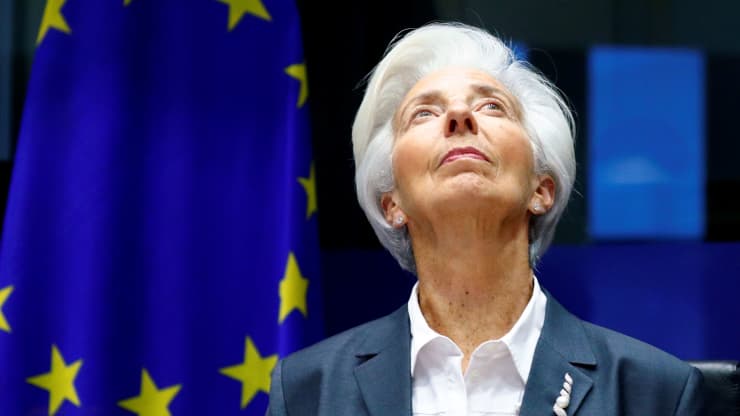“Preserving favorable financing conditions over the pandemic period.”
Those are the words from the European Central Bank that are likely to come to the fore over the next few months, as the Frankfurt-based organization changes tact after bolstering its 1.85 trillion-euro stimulus package in December.
The ECB’s Governing Council, led by President Christine Lagarde, will now likely pause for the foreseeable future and use this week’s meeting to steer markets in a new direction, as well as discussing the strength of the euro.
“A more realistic objective, (rather) than aiming for 2% inflation two or three years ahead, is thus to focus on protecting favourable finance conditions, at the lowest cost possible while allowing a longer period for inflation to converge to target,” said Anatoli Annenkov, a senior European economist at Societe Generale, in a research note.
“We thus see the ECB on hold for the near term, although growth expectations are weakening amid prolonged lockdowns.”
Spotlight off sovereign yields
Some market watchers believe this focus on financial conditions, effectively whether banks are lending to businesses and the real economy, may be a ploy so there’s less of a spotlight on sovereign yields — how much interest the euro zone governments are paying on their debts.
“The ECB is trying to shift the market’s focus from yields to financial conditions,” said Mark Wall, the chief economist at Deutsche Bank, in a research note last week.
“The more convinced the ECB is that bank-based financial conditions indicators are improving sustainably, the less sensitive the ECB is likely to be about a rise in yields.”
Euro strength
Inflation in the euro area is close, if not at, record lows and the ECB’s December staff projections also notched a new low. On top of that comes the euro’s recent strength which is an additional drag on inflation. The single currency is currently trading near $1.2119 but was closer to $1.10 before the onset of the coronavirus pandemic.
Why investors have backed the euro is not entirely clear, especially as it looks like the U.S. Federal Reserve will lift rates a lot earlier than the ECB.
At a Reuters event this month, Lagarde said the central bank will be “extremely attentive” to foreign exchange movements and its impact on consumer prices. France’s Governor François Villeroy de Galhau also stressed the need to examine any negative effects of the euro’s strength on inflation in an interview with French TV.
Strategy review
While the ECB is set to be on hold for the next few months, it will likely focus on its recently-announced strategy review.
Since 2003, the euro zone’s central bank has targeted an inflation rate “below, but close to 2%” in an attempt to address concerns over significant consumer price rises. However, the ECB is currently more worried about sluggish price increases. As a result, the strategy review in Frankfurt could lead to a new target.
“They will aim to find a consensus view before the summer,” said Annenkov. “The expected reformulation of the inflation target to a symmetrical one around 2% should not be controversial.”
The key test will come in September. After the summer break, the Governing Council may need to revisit its monetary policy, six months before the scheduled expiry of its unprecedented bond purchases.
Latest Stories
-
Paris 2024: Opening ceremony showcases grandiose celebration of French culture and diversity
3 hours -
Spectacular photos from the Paris 2024 opening ceremony
4 hours -
How decline of Indian vultures led to 500,000 human deaths
4 hours -
Paris 2024: Ghana rocks ‘fabulous fugu’ at olympics opening ceremony
4 hours -
Trust Hospital faces financial strain with rising debt levels – Auditor-General’s report
5 hours -
Electrochem lease: Allocate portions of land to Songor people – Resident demand
5 hours -
82 widows receive financial aid from Chayil Foundation
5 hours -
The silent struggles: Female journalists grapple with Ghana’s high cost of living
5 hours -
BoG yet to make any payment to Service Ghana Auto Group
6 hours -
‘Crushed Young’: The Multimedia Group, JL Properties surprise accident victim’s family with fully-furnished apartment
6 hours -
Asante Kotoko needs structure that would outlive any administration – Opoku Nti
7 hours -
JoyNews exposé on Customs officials demanding bribes airs on July 29
7 hours -
JoyNews Impact Maker Awardee ships first consignment of honey from Kwahu Afram Plains
8 hours -
Joint committee under fire over report on salt mining lease granted Electrochem
8 hours -
Life Lounge with Edem Knight-Tay: Don’t be beaten the third time
9 hours

